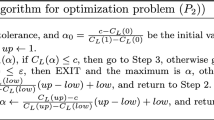Abstract
This study evaluates a time changed Lévy model for European call options under a fuzzy environment. The proposed model is characterized by high frequency jumps, stochastic volatility, and stochastic volatility with the jumps, existing in the returns process of financial assets. Moreover, to consider imperfect and unpredictable accounting information, this study uses fuzzy logic to account for the impreciseness of the accounting information, which can not be described in extant models, and provides reasonable reference instruments for future research on option pricing under a jump diffusion model with imprecise market information. Our empirical results also show that the fuzzy time changed Lévy model has better fitting performance when compared with the time changed Lévy and the Black and Scholes model when using S&P 500 index option data.


Similar content being viewed by others
Explore related subjects
Discover the latest articles, news and stories from top researchers in related subjects.Notes
Cont (2001) carried out an empirical study of various types of financial markets, and found that the asset returns distribution has several statistical properties, including the leverage effect, asymmetric time scale, high peaks, heavy tails, and so on.
Triangular fuzzy numbers resemble trapezoidal fuzzy numbers. When using trapezoidal fuzzy numbers, the most likely value lies in the same period, \(a\) and \(b\), as the triangular fuzzy number. To increase both the reliability and simplicity of the model, this study uses the most popular sharp function, the triangular fuzzy function, as the sharp function.
The definition of the exponential martingale represents that the expectation of Eq. (18) is equivalent to one.
References
Appadoo, S. S., Bhatt, S. K., & Bector, C. R. (2008). Application of possibility theory to investment decisions. Fuzzy Optimization and Decision Making, 7, 35–57.
Bakshi, G., Cao, C., & Chen, Z. (1997). Equilibrium valuation of foreign exchange claims. Journal of Finance, 52, 799–826.
Black, F., & Scholes, M. (1973). The pricing of options and corporate liabilities. Journal of Political Economy, 81, 637–654.
Cadenas, J. M., Carrillo, J. V., Garrido, M. C., Ivorra, C., & Liern, V. (2012). Exact and heuristic procedures for solving the fuzzy portfolio selection problem. Fuzzy Optimization and Decision Making, 11, 29–46.
Carr, P., Geman, H., Madan, D., & Yor, M. (2002). The fine structure of asset returns: An empirical investigation. Journal of Business, 75, 305–332.
Carr, P., Geman, H., Madan, D., & Yor, M. (2003). Stochastic volatility for Lévy processes. Mathematical Finance, 13, 345–382.
Carr, P., & Madan, D. (1999). Option valuation using the fast Fourier transform. Journal of Computational Finance, 2, 61–73.
Carr, P., & Wu, L. (2003). Finite moment log stable process and option pricing. Journal of Finance, 58, 753–777.
Carr, P., & Wu, L. (2004). Time-changed Lévy processes and option pricing. Journal of Financial Economics, 71, 113–141.
Chen, X., Liu, Y., & Ralescu, D. A. (2013). Uncertainty stock model with periodic dividends. Fuzzy Optimization and Decision Making, 12, 111–123.
Cont, R. (2001). Empirical properties of asset returns: Stylized facts and statistical issues. Quantitative Finance, 1, 223–236.
Cox, J., Ingersoll, J., & Ross, S. (1985). A theory of the term structure of interest rates. Econometrica, 53, 385–408.
Duffie, D., Pan, J., & Singleton, K. (2000). Transform analysis and asset pricing for affine jump-diffusions. Econometrica, 68, 1343–1376.
Fullér, R. (1991). On product-sum of triangular fuzzy numbers. Fuzzy Sets and Systems, 41, 83–87.
Fullér, R., & Majlender, P. (2003). On weighted possibilistic mean value and variance of fuzzy numbers. Fuzzy Sets and Systems, 136, 363–374.
Geman, H., Madan, D., & Yor, M. (2001). Time changes for Lévy processes. Mathematical Finance, 11, 79–96.
Huang, J., & Wu, L. (2004). Specification analysis of option pricing models based on time-changed Lévy processes. Journal of Finance, 59, 1405–1440.
Kou, S. G. (2002). A jump-diffusion model for option pricing. Management Science, 48, 1086–1101.
Kwakernaak, H. (1978). Fuzzy random variables I: Definitions and theorems. Information Sciences, 15, 1–29.
Merton, R. C. (1976). Option pricing when underlying stock return are discontinuous. Journal of Financial Economics, 3, 125–144.
Puri, M., & Ralescu, D. (1986). Fuzzy random variables. Journal Mathematical Analysis and Applications, 114, 409–422.
Rubinstein, M. (1994). Implied binomial trees. Journal of Finance, 49, 771–818.
Thavaneswaran, A., Thiagarajah, K., & Appadoo, S. S. (2007). Fuzzy coefficient volatility models with applications. Mathematical and Computer Modelling, 45, 777–786.
Xu, W., Wu, C., Xu, W., & Li, H. (2009). a jump-diffusion model for option pricing under fuzzy environments. Insurance: Mathematics and Economics, 44, 337–344.
Xu, W., Xu, W., Li, H., & Zhang, W. (2010). A study of Greek letters of currency option under uncertainty environments. Mathematical and Computer Modeling, 51, 670–681.
Yoshida, Y., Yasuda, M., Nakagami, J., & Kurano, M. (2005). A discrete-time American put option model with fuzziness of stock prices. Fuzzy Optimization and Decision Making, 4, 191–207.
Yoshida, Y., Yasuda, M., Nakagami, J., & Kurano, M. (2006). A new evaluation of mean value for fuzzy numbers and its application to American put option under uncertainty. Fuzzy Sets and Systems, 157, 2614–2626.
Zadeh, L. A. (1965). Fuzzy sets. Information and Control, 8, 338–353.
Zadeh, L. A. (1975). The concept of a linguistic variable and its application to approximate reasoning. Part 1. Information Sciences, 8, 199–249. Part 2. Information Sciences, 8, 301–353. Part 3. Information Sciences, 9, 43–80.
Acknowledgments
We thank Shu-Cherng Fang (the editor) and the anonymous reviewers for helpful comments and suggestions.
Author information
Authors and Affiliations
Corresponding author
Rights and permissions
About this article
Cite this article
Feng, ZY., Cheng, J.TS., Liu, YH. et al. Options pricing with time changed Lévy processes under imprecise information. Fuzzy Optim Decis Making 14, 97–119 (2015). https://doi.org/10.1007/s10700-014-9191-3
Published:
Issue Date:
DOI: https://doi.org/10.1007/s10700-014-9191-3




